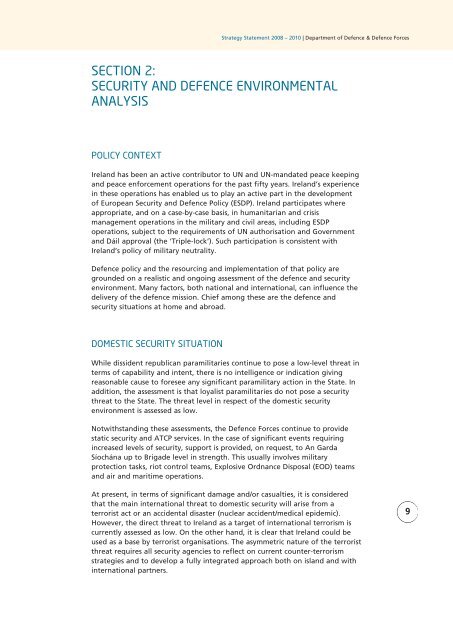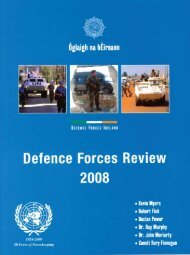Strategy Statement 2008 - 2010 - Department of Defence
Strategy Statement 2008 - 2010 - Department of Defence
Strategy Statement 2008 - 2010 - Department of Defence
Create successful ePaper yourself
Turn your PDF publications into a flip-book with our unique Google optimized e-Paper software.
<strong>Strategy</strong> <strong>Statement</strong> <strong>2008</strong> – <strong>2010</strong> | <strong>Department</strong> <strong>of</strong> <strong>Defence</strong> & <strong>Defence</strong> Forces<br />
SECTION 2:<br />
SECURITY AND DEFENCE ENVIRONMENTAL<br />
ANALYSIS<br />
POLICY CONTEXT<br />
Ireland has been an active contributor to UN and UN-mandated peace keeping<br />
and peace enforcement operations for the past fifty years. Ireland’s experience<br />
in these operations has enabled us to play an active part in the development<br />
<strong>of</strong> European Security and <strong>Defence</strong> Policy (ESDP). Ireland participates where<br />
appropriate, and on a case-by-case basis, in humanitarian and crisis<br />
management operations in the military and civil areas, including ESDP<br />
operations, subject to the requirements <strong>of</strong> UN authorisation and Government<br />
and Dáil approval (the ‘Triple-lock’). Such participation is consistent with<br />
Ireland’s policy <strong>of</strong> military neutrality.<br />
<strong>Defence</strong> policy and the resourcing and implementation <strong>of</strong> that policy are<br />
grounded on a realistic and ongoing assessment <strong>of</strong> the defence and security<br />
environment. Many factors, both national and international, can influence the<br />
delivery <strong>of</strong> the defence mission. Chief among these are the defence and<br />
security situations at home and abroad.<br />
DOMESTIC SECURITY SITUATION<br />
While dissident republican paramilitaries continue to pose a low-level threat in<br />
terms <strong>of</strong> capability and intent, there is no intelligence or indication giving<br />
reasonable cause to foresee any significant paramilitary action in the State. In<br />
addition, the assessment is that loyalist paramilitaries do not pose a security<br />
threat to the State. The threat level in respect <strong>of</strong> the domestic security<br />
environment is assessed as low.<br />
Notwithstanding these assessments, the <strong>Defence</strong> Forces continue to provide<br />
static security and ATCP services. In the case <strong>of</strong> significant events requiring<br />
increased levels <strong>of</strong> security, support is provided, on request, to An Garda<br />
Síochána up to Brigade level in strength. This usually involves military<br />
protection tasks, riot control teams, Explosive Ordnance Disposal (EOD) teams<br />
and air and maritime operations.<br />
At present, in terms <strong>of</strong> significant damage and/or casualties, it is considered<br />
that the main international threat to domestic security will arise from a<br />
terrorist act or an accidental disaster (nuclear accident/medical epidemic).<br />
However, the direct threat to Ireland as a target <strong>of</strong> international terrorism is<br />
currently assessed as low. On the other hand, it is clear that Ireland could be<br />
used as a base by terrorist organisations. The asymmetric nature <strong>of</strong> the terrorist<br />
threat requires all security agencies to reflect on current counter-terrorism<br />
strategies and to develop a fully integrated approach both on island and with<br />
international partners.<br />
9
















